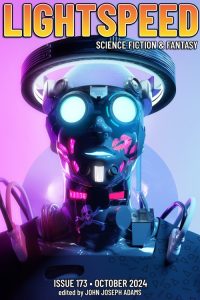Lightspeed, Baffling, GigaNotoSaurus, and Small Wonders: Short Fiction Reviews by Charles Payseur
 Lightspeed 10/24
Lightspeed 10/24
Baffling 10/24
GigaNotoSaurus 10/24
Small Wonders 10/24
Philip Gelatt and JT Petty anchor the October Lightspeed with “Sully the God”, which imagines Sully as the Elon Musk of magic, the man who stole the discovery from a dead colleague and turned it into the most successful business the world has ever known. He’s become so rich that money has sort of lost meaning, and yet for all his wild success he’s still an incredibly fragile and deeply awful person. The story follows his introduction to the world of fairies, beings that can allow people to fly, but who also can kill those who do not follow their rules. It’s another massive success for Sully, but it also shows just how Sully is his own worst enemy, incapable of approaching problems rationally and instead veering wildly between tantrums, bribes, and bad decisions in general. Gelatt and Petty keep their satire sharp and damning, showing the pitfalls of worshipping wealth and those good at accumulating it, who are often the worst role models available. It’s a humorous and delightful story.
October also brought a new issue of Baffling, which opens with Oluwatomiwa Ajeigbe’s yearning “In Every Version of the Universe, You Are Gone”, which follows a cursed sentient ship that had long carried Seun, a warrior with a cursed sword. The two seemed to complete each other, a perfect match as they moved through the universes, finding and destroying entire armies along the way. But when Seun tries to escape her curse for good and leaves the ship behind, the ship must escape its own cage to follow after, seeking the connection and fullness that made even the violence they faced together something comforting and precious. Ajeigbe looks at the weight of the curses the characters carry and the cost of trying to break them, showing the lengths they will go to in order to be free and together and whole. It’s a beautiful story. Tina Zhu also contributes to the issue with “What Kind of Monster are You?” It unfolds a bit like a choose-your-own adventure, except that the options are very limited. Because you are a girl who likes girls, and that means you are a monster, you can either accept it or fight against it – can either attempt to deny who you are or embrace a world that is that much more dangerous. Tellingly, safety and ease are off the table entirely, and the choices the story offers range from difficult to impossible. Zhu shows that sometimes freedom isn’t a happy ending free from strife, that sometimes freedom is still facing down hardships and going on regardless, unbent by the pressures to conform and erase what makes you… you. It’s wonderful!
R.Z. Held appears in the October GigaNotoSaurus with “To Sacrifice Others”, which finds Regan alone, working for an enemy that assumes it has her loyalty thanks to an implanted chip in her brain. Luckily for her, though, a previous modification that went unnoticed has allowed her to push back against the control and see the full horror of what she’s a part of – an empire built on the co-opted loyalty of vast swathes of its subjects. She wants to fight back, but it’s only when she encounters a group of her people who have been captured, who she is supposed to implant with the loyalty chips, that she finds the opportunity to do something. The piece looks heavily into complicity and individual effort and culpability in the face of pervasive injustice. Regan has to live with what she’s done, and what she continues to do to both try and survive and try to make that survival mean something. Held crafts a tense and complex narrative that doesn’t let readers look away from the human costs of what’s happening, but also doesn’t condemn Regan for not being able to singlehandedly defeat an entrenched and powerful empire. It’s very much worth checking out!
The latest from Small Wonders opens with Sylvie Althoff’s strange “Business As Usual”, which unfolds in a grocery store as the story’s narrator realizes their cashier was in their dream the last night. Indeed, the cashier killed them. And given that everyone has been sharing a dream lately, where they all run through a wood hunting or being hunted, they know the cashier remembers what happened as well. Which is… awkward. The piece complicates the social contract by having this shared dream space encroach on the waking world, pushing people to confront what they had no control in doing. It’s odd but compelling, and Althoff vividly captures the mix of emotions swirling around this chance encounter.
Recommended Stories:
“In Every Version of the Universe, You Are Gone”, Oluwatomiwa Ajeigbe (Baffling 10/24)
“To Sacrifice Others”, R.Z. Held (GigaNotoSaurus 10/24)
“Business As Usual”, Sylvie Althoff (Small Wonders 10/24)
Charles Payseur is an avid reader, writer, and reviewer of speculative fiction. His works have appeared in The Best American Science Fiction and Fantasy, Lightspeed Magazine, and Beneath Ceaseless Skies, among others, and many are included in his debut collection, The Burning Day and Other Strange Stories (Lethe Press 2021). He is the series editor of We’re Here: The Best Queer Speculative Fiction (Neon Hemlock Press) and a multiple-time Hugo and Ignyte Award finalist for his work at Quick Sip Reviews. When not drunkenly discussing Goosebumps, X-Men comic books, and his cats on his Patreon (/quicksipreviews) and Twitter (@ClowderofTwo), he can probably found raising a beer with his husband, Matt, in their home in Eau Claire, Wisconsin.
This review and more like it in the December 2024 issue of Locus.
 While you are here, please take a moment to support Locus with a one-time or recurring donation. We rely on reader donations to keep the magazine and site going, and would like to keep the site paywall free, but WE NEED YOUR FINANCIAL SUPPORT to continue quality coverage of the science fiction and fantasy field.
While you are here, please take a moment to support Locus with a one-time or recurring donation. We rely on reader donations to keep the magazine and site going, and would like to keep the site paywall free, but WE NEED YOUR FINANCIAL SUPPORT to continue quality coverage of the science fiction and fantasy field.
©Locus Magazine. Copyrighted material may not be republished without permission of LSFF.







